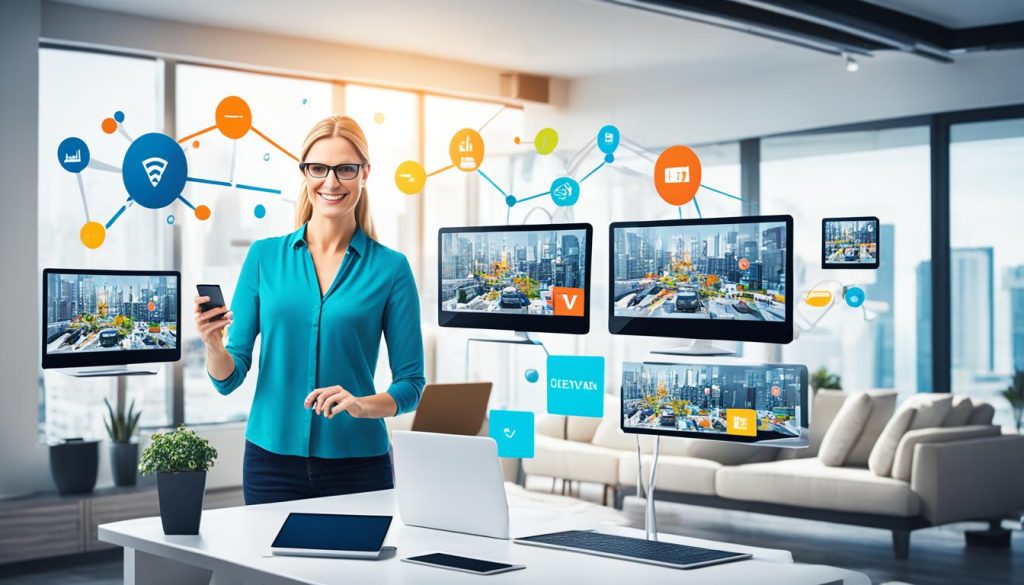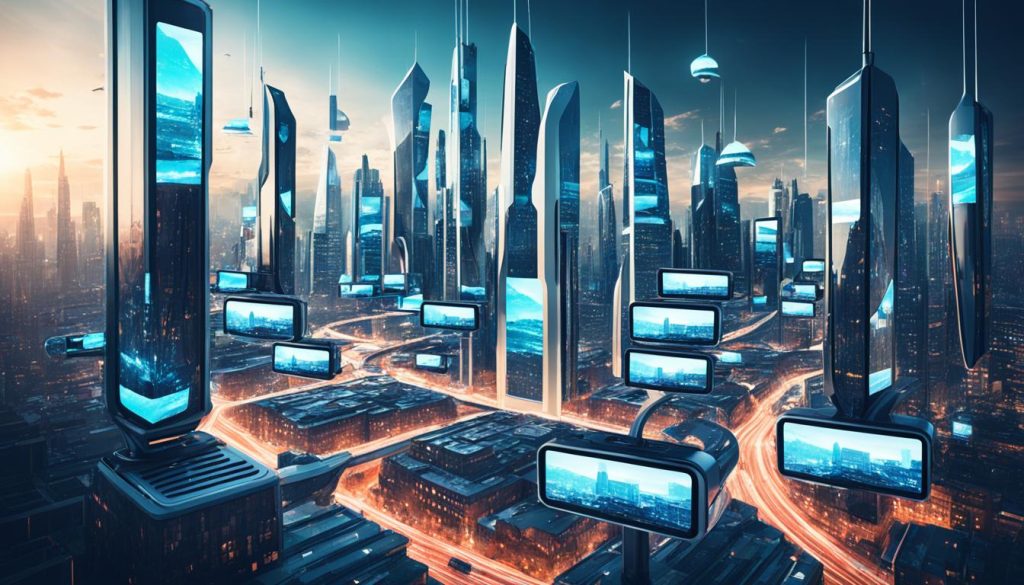IPTV delivers television content over the internet, rather than through traditional terrestrial, satellite, or cable formats. This shift represents a fundamental evolution in how we consume media. IPTV is poised to become an integral part of the connected future, seamlessly integrating with smart home technologies and the Internet of Things (IoT) to provide a cohesive and immersive entertainment experience. The widespread availability of high-speed internet and the rise of smart devices have facilitated the adoption of IPTV, as viewers increasingly prefer on-demand content and the ability to watch TV on multiple devices.
Key Takeaways
- IPTV delivers television content over the internet, revolutionising media consumption
- IPTV is integrating with smart home technologies and the Internet of Things for a connected future
- High-speed internet and smart device proliferation have driven IPTV adoption
- Viewers prefer on-demand content and multi-device support offered by IPTV
- Emerging IPTV trends include enhanced streaming quality, personalised experiences, and seamless connectivity
The Transformative Impact of IPTV on the Television Landscape
IPTV has seen significant growth in recent years, driven by advancements in technology and changes in consumer behaviour. The widespread availability of high-speed internet and the rise of smart TVs, smartphones, and streaming devices have facilitated the adoption of IPTV. IPTV offers numerous advantages over traditional TV formats, including on-demand content, interactivity, and multi-device support.
Redefining Content Delivery and Consumption
IPTV has spurred innovation in content delivery methods, enhancing the quality and reliability of streaming through technologies like high-definition and 4K streaming, adaptive bitrate streaming, and cloud-based solutions. This has revolutionized the way viewers access and consume content, providing them with a more seamless and immersive experience. The integration of IPTV with 5G networks has further improved the quality and responsiveness of streaming, ensuring a more reliable and enjoyable viewing experience.
Increased Internet Penetration and Smart Device Proliferation
The widespread availability of high-speed internet and the proliferation of smart devices have been crucial factors in the growth of IPTV. Viewers can now access a vast array of content on multiple devices, from televisions and smartphones to tablets and laptops. This has democratised content access, enabling viewers to discover and enjoy a wider range of programming, including global, niche, and personalised offerings. The integration of IPTV with Artificial Intelligence and the Internet of Things has further enhanced the personalisation and connectivity of the viewing experience.
Democratising Content Access and Affordability
IPTV has also democratised content access, enabling viewers to access a vast array of channels and programs that might be unavailable through traditional TV services. This global reach and niche programming have made content more affordable and accessible, empowering viewers to curate their own viewing experiences. IPTV personalisation and IPTV security enhancements have further improved the user experience, ensuring a more tailored and secure viewing environment.
How is IPTV evolving with new technologies?
The future potential of IPTV is immense, with several emerging trends poised to shape its evolution. The rollout of 5G networks will provide faster and more reliable internet connections, enhancing the quality of IPTV services and enabling IPTV and 5G networks to converge seamlessly.
Integration with 5G Networks for Enhanced Streaming Quality
5G’s low latency and high bandwidth capabilities will revolutionise IPTV, delivering a more immersive and responsive viewing experience. Viewers will enjoy crisper, high-definition content with minimal buffering, while IPTV providers can leverage 5G to offer innovative features like multi-angle live streaming and interactive experiences.
Artificial Intelligence and Machine Learning for Personalised Experiences
Artificial Intelligence (AI) and Machine Learning (ML) will enable IPTV providers to offer more personalised viewing experiences. AI-driven recommendations and content curation will ensure viewers discover relevant programmes and movies, while ML algorithms will analyse user preferences to deliver IPTV and Artificial Intelligence-powered experiences tailored to individual tastes.
Leveraging the Internet of Things for Seamless Connectivity
As the Internet of Things (IoT) continues to expand, IPTV will become increasingly integrated with smart home devices and appliances. This convergence will allow for seamless content sharing, remote control, and device coordination, transforming the living room into a hub of interconnected entertainment and automation. IPTV and Internet of Things will work in harmony to provide a truly immersive and convenient viewing experience.

Conclusion
IPTV has emerged as a transformative force in the television landscape, offering unprecedented flexibility, accessibility, and quality. Its impact on the media industry has been profound, driving innovation and creating new opportunities for content creators and consumers alike. As technology continues to evolve, IPTV’s potential to further transform our viewing habits and media consumption is immense.
The widespread availability of high-speed internet and the proliferation of smart devices have facilitated the adoption of IPTV, enabling viewers to access a vast array of channels and programmes that may have been previously unavailable through traditional TV services. This democratisation of content access has empowered consumers, providing them with greater choice and affordability.
Moreover, the integration of IPTV with emerging technologies, such as 5G networks, Artificial Intelligence, and the Internet of Things, promises to further enhance the viewing experience. Faster and more reliable internet connections, personalised recommendations, and seamless connectivity could revolutionise the way we consume media, ushering in a more dynamic, personalized, and inclusive future for television.
As the television landscape continues to evolve, embracing the transformative potential of IPTV will be crucial in shaping the future of the media industry. By leveraging these advancements, content creators and service providers can deliver a more enriching and engaging viewing experience, catering to the evolving preferences of audiences worldwide.
FAQ
What is IPTV?
IPTV, or Internet Protocol Television, is a technology that delivers television content over the internet, rather than through traditional terrestrial, satellite, or cable formats.
How has IPTV evolved in recent years?
IPTV has seen significant growth in recent years, driven by advancements in technology and changes in consumer behaviour. The widespread availability of high-speed internet and the rise of smart TVs, smartphones, and streaming devices have facilitated the adoption of IPTV.
What are the advantages of IPTV over traditional TV formats?
IPTV offers numerous advantages over traditional TV formats, including on-demand content, interactivity, and multi-device support. It has also democratised content access, enabling viewers to access a vast array of channels and programs that might be unavailable through traditional TV services, with global reach, niche programming, and reduced costs.
How is IPTV technology advancing?
IPTV has spurred innovation in content delivery methods, enhancing the quality and reliability of streaming through technologies like high-definition and 4K streaming, adaptive bitrate streaming, and cloud-based solutions.
What are the emerging trends shaping the future of IPTV?
The future potential of IPTV is immense, with several emerging trends poised to shape its evolution. These include the rollout of 5G networks, the integration of Artificial Intelligence (AI) and Machine Learning (ML) for personalised viewing experiences, and the potential for immersive viewing experiences through Virtual Reality (VR) and Augmented Reality (AR) technologies.
How will IPTV integrate with other technologies?
IPTV could also include more interactive features, such as social media integration, live polling, and real-time viewer engagement, leveraging the capabilities of the Internet of Things (IoT) for seamless connectivity.
What are the security considerations for IPTV?
As IPTV continues to evolve, enhancing security measures will be crucial to protect user data and content from potential threats.



